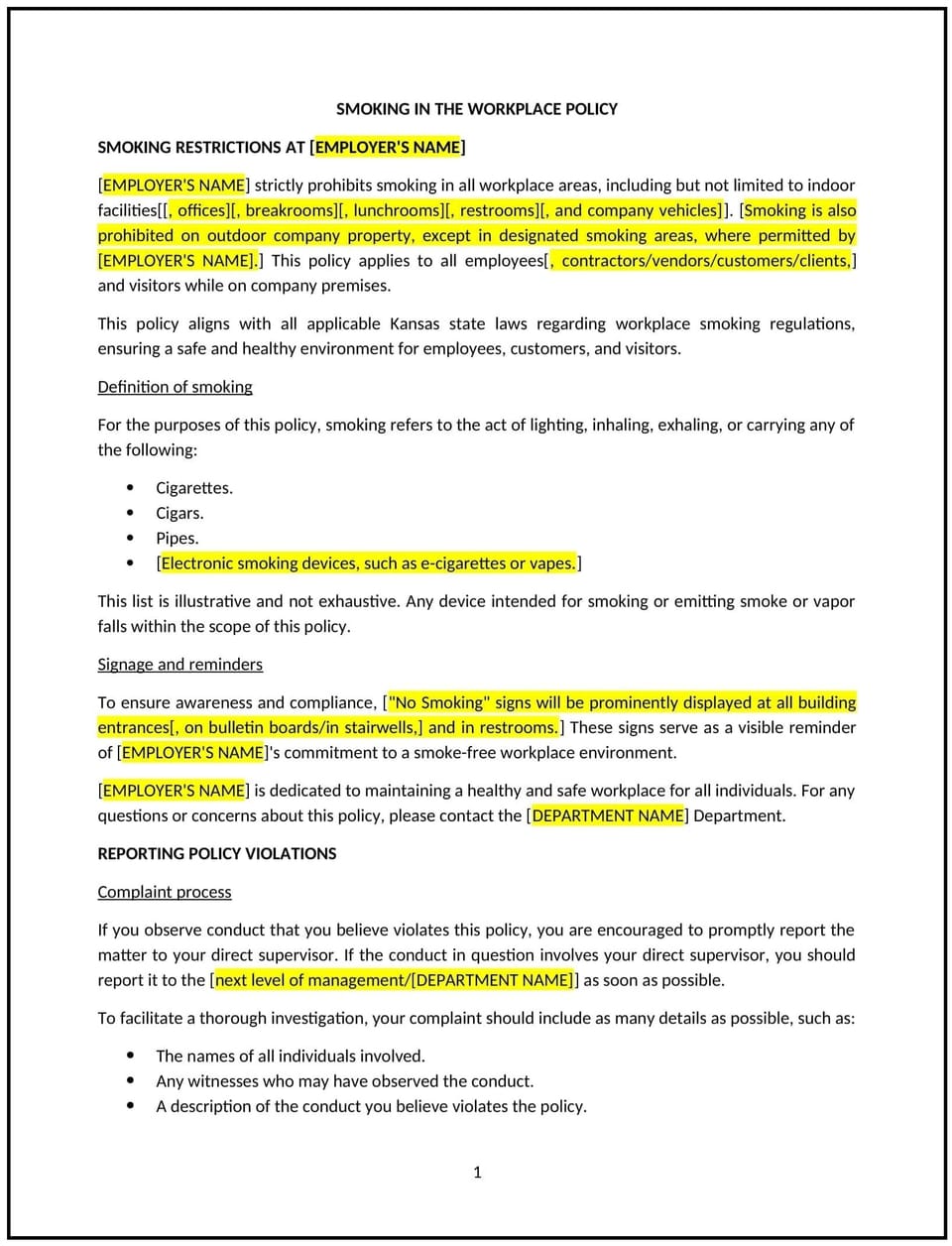Smoking in the workplace policy (Kansas): Free template

Smoking in the workplace policy (Kansas)
A smoking in the workplace policy helps Kansas businesses maintain a healthy and safe environment by regulating smoking on company premises. This policy outlines where smoking is permitted, how employees should handle smoking breaks, and the responsibilities of both the employer and employees in creating a smoke-free environment.
By implementing this policy, businesses can reduce health risks associated with smoking, improve air quality, and enhance the overall well-being of employees and visitors.
How to use this smoking in the workplace policy (Kansas)
- Define smoking areas: Businesses should specify where smoking is permitted on company property, such as designated outdoor smoking areas, and outline any restrictions related to proximity to entrances or windows.
- Set smoking break guidelines: The policy should define how many breaks employees are allowed for smoking during work hours, ensuring that breaks do not interfere with productivity or business operations.
- Encourage non-smoking behavior: The policy should encourage employees who smoke to consider smoking cessation programs and promote a healthy, smoke-free lifestyle.
- Address e-cigarettes and vaping: The policy should clarify whether e-cigarettes or vaping devices are treated the same as traditional cigarettes or if they are allowed in certain areas of the workplace.
- Set consequences for policy violations: Businesses should define the disciplinary actions that will be taken if employees fail to adhere to the smoking policy, such as warnings, fines, or other corrective actions.
- Provide signage: Clearly visible signs should be posted to inform employees and visitors about the designated smoking areas and the smoke-free zones within the workplace.
- Review and update regularly: The policy should be reviewed periodically to ensure it aligns with current laws, health guidelines, and the company’s changing needs.
Benefits of using a smoking in the workplace policy (Kansas)
- Promotes a healthier workplace: By limiting smoking in the workplace, businesses can reduce exposure to harmful secondhand smoke, improving the health of employees and visitors.
- Improves air quality: A smoke-free environment creates a cleaner and more comfortable atmosphere, enhancing employee satisfaction and productivity.
- Reduces healthcare costs: A smoking-free workplace can contribute to lower healthcare costs by reducing smoking-related illnesses and absenteeism.
- Increases productivity: Employees will be less likely to take frequent or prolonged breaks for smoking, leading to improved focus and productivity.
- Supports employee well-being: Encouraging non-smoking behavior and offering resources for smoking cessation can help employees lead healthier lives and reduce their dependence on tobacco.
- Enhances company reputation: A commitment to a smoke-free workplace can improve the company’s image and attract employees who value a healthy and responsible work environment.
Tips for using this smoking in the workplace policy (Kansas)
- Communicate the policy clearly: Businesses should ensure that all employees understand the smoking policy, including where smoking is allowed, the rules surrounding smoking breaks, and the consequences for violating the policy.
- Provide smoking cessation resources: Businesses can support employees who wish to quit smoking by offering smoking cessation programs, counseling, or referrals to external resources.
- Monitor adherence to the policy: Managers should regularly check that employees are adhering to the smoking policy and address any violations promptly and professionally.
- Maintain designated smoking areas: Clearly mark the designated smoking areas and ensure they are equipped with proper waste disposal, such as ashtrays or cigarette bins.
- Lead by example: Management should model the company’s smoking policy by respecting designated smoking areas and reinforcing the importance of a smoke-free environment.
- Review the policy regularly: Businesses should review and update the smoking policy periodically to ensure it meets employee needs, legal requirements, and health guidelines.
Q: Why should Kansas businesses implement a smoking in the workplace policy?
A: Businesses should implement a smoking in the workplace policy to promote a healthier environment, reduce the risks of secondhand smoke, enhance employee well-being, and comply with health and safety regulations.
Q: Where can employees smoke at work?
A: The policy should specify designated smoking areas on the company’s property, including outdoor spaces that are away from building entrances, windows, or air intakes to prevent smoke from entering the workplace.
Q: Can employees take smoking breaks during work hours?
A: The policy should outline the number and duration of smoking breaks allowed during work hours. Businesses may want to limit smoking breaks to prevent disruptions to work performance and ensure that employees remain productive.
Q: Are e-cigarettes and vaping devices covered by the smoking policy?
A: The policy should clarify whether e-cigarettes and vaping devices are subject to the same restrictions as traditional smoking or if they are allowed in certain areas. Many businesses treat e-cigarettes and vaping the same as smoking.
Q: What happens if an employee violates the smoking policy?
A: The policy should specify the consequences for policy violations, which may include verbal or written warnings, fines, or other disciplinary actions, depending on the severity and frequency of violations.
Q: How can businesses support employees who want to quit smoking?
A: Businesses can offer smoking cessation programs, provide resources or counseling services, or support employees who are trying to quit by allowing flexibility in break times or offering incentives for non-smoking behavior.
Q: How often should businesses review and update their smoking in the workplace policy?
A: Businesses should review and update the smoking policy regularly, at least annually, or whenever there are changes to legal requirements, health guidelines, or company needs to ensure that it remains relevant and effective.
This article contains general legal information and does not contain legal advice. Cobrief is not a law firm or a substitute for an attorney or law firm. The law is complex and changes often. For legal advice, please ask a lawyer.


